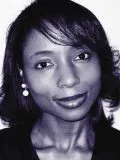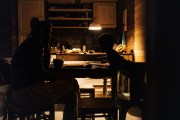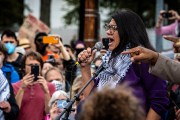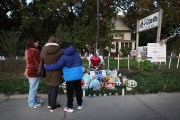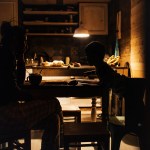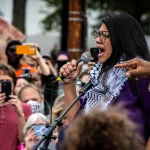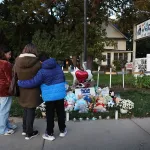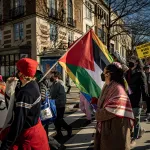The demonstrators in downtown Atlanta held Palestinian flags and wore keffiyehs. They prayed, they sang. They carried signs stating “Stop the Genocidal Bombing of Palestine” and “End All U.S. Aid to Apartheid Israel.” Numbering in the several thousands, the throngs included born-and-bred Georgians and visitors from as far as Ireland.
Protests calling for a ceasefire in the occupied Palestinian territory of Gaza have been held across the globe, but the activist who organized this particular march stood out: She’s a sophomore at Spelman College.
“I decided to take the initiative to spread awareness and have our community come together,” Rokiyah Darbo said.
At her historically Black women’s college, Darbo is hardly the only student advocating for Palestinians, who have been ensnared in a conflict with Israel over land, politics and equality that predates Israel’s 1948 creation.
In 2014, out of its Women’s Research and Resource Center, Spelman launched one of the first Students for Justice in Palestine chapters at an HBCU in the wake of protests over the police killing of Mike Brown in Ferguson, Missouri. Spelman students and scholars say they see a link between how Americans of color and Palestinians are policed, contending that Palestinians face the racial, economic and gender injustices that oppressed groups domestically and globally do.
“I started doing research on Black liberation and how it parallels with what’s going on in Palestine,” Darbo said. “It just really moved me.”
She has been a vocal advocate for Palestinians since 2019. As a high school student in Smyrna, Georgia, Darbo said that she received criticism for her activism but believes the war on Gaza has made it “more apparent to people what’s actually going on.”
Israel began its war on Gaza after Hamas, the militant group that governs the strip, killed about 1,200 Israelis and took another 240 hostage during an October 7 terrorist attack near the Israel-Gaza border. In the month afterward, Israel’s bombardment of Gaza has killed more than 11,000 Palestinians, nearly 70 percent of whom were children, women or elderly, according to the Gaza Health Ministry.
-
Read Next:
Israeli airstrikes have hit schools, churches, mosques, refugee camps, hospitals, ambulances and journalists. Israeli officials say that Hamas is operating out of hospitals such as Al-Shifa, Gaza’s biggest medical establishment. Both the militant group and medical administrators have denied this claim, and human rights experts say that bombing civilian-heavy areas amounts to collective punishment of the Palestinian people for Hamas’ terrorist attack. Leaders from the United States, a top Israel ally, have denied the collective punishment characterization and refused to call for a ceasefire while acknowledging, in Secretary of State Antony Blinken’s words, that “far too many” civilians have been killed in the conflict.
The plight of Palestinians is personal for Banah Ghadbian, the founder of the Spelman-led chapter of Students for Justice in Palestine — which includes students from other schools that belong to the Atlanta University Center (AUC), a consortium of the city’s HBCUs. The 2015 Spelman graduate is now an assistant gender studies professor at the college and faculty adviser for the club.
“My grandmother, grandfather, experienced Israeli bombing in Syria, and my father grew up with that,” said Ghadbian, a Syrian American, noting that Israel occupied parts of their family’s homeland. Some of Ghadbian’s relatives are Palestinian as well.
A trip to the West Bank in 2014 prompted Ghadbian to start a solidarity group at Spelman. In the occupied territory, they encountered hundreds of Israeli-run military checkpoints, roadblocks and other barriers that limit the movement of Palestinians, who need permits to enter certain areas and are prohibited from entering other areas entirely.
“We stayed with friends who are not allowed to build on their house or expand on their land,” Ghadbian said. “They’re under 24-hour surveillance by the Israeli military. They are under constant threat of death, essentially.”
In July 2014, Israeli citizens kidnapped, beat and burned alive a Palestinian teenager named Mohammed Abu Khdeir, a crime reportedly carried out in response to the kidnapping and murder of three Israeli teens by Palestinian militants earlier that year. The case led Palestinians to demonstrate and to Israel’s 2014 bombardment of Gaza.
When Ghadbian returned to the United States, amid Black Lives Matter (BLM) protests over the police shooting of Brown, they saw a connection between the Ferguson uprising and Palestinian protests over Khdeir’s murder. They pointed out that Palestinians used social media to tell BLM activists how to withstand tear gas from police “because those are U.S.-funded weapons that they knew intimately,” Ghadbian said. They added that the Atlanta Police Department and many other law enforcement agencies in the U.S. receive training in Israel, leading Ghadbian to see “global linkages” between the policing of Palestinians and Americans of color.
With the encouragement of Spelman faculty, Ghadbian screened a documentary called “Roadmap to Apartheid” when they were a student. The film explores the Israeli-Palestinian conflict by engaging with the history of South Africa. “Our freedom is incomplete without the freedom of the Palestinians,” then-President Nelson Mandela said in 1997, just a few years after apartheid ended in his country. After the film screening, Ghadbian circulated a signup sheet for students interested in participating in a club that eventually became a chapter of Students for Justice in Palestine.
The group started with five members and now has 65, according to Ghadbian. It has invited students from Birzeit University in the West Bank to discuss their experiences and written an open letter to protest a pro-Israel lobbying group’s influence on some college campuses. The organization also holds teach-ins, discussions and consciousness-raising activities. When it began, it not only aimed to promote justice for Palestinians but to confront a wide range of issues affecting Black, Indigenous, Latinx, Arab and Asian Americans in Atlanta, the South and the United States. Those challenges include police brutality, white supremacy, mass incarceration, sexual violence and the colonial occupation of Indigenous land.
“So the main goal was to basically connect the local to the global and also come out of this very kind of Black feminist lineage of supporting Palestine,” Ghadbian said.
For years, Spelman College women’s studies professor Beverly Guy-Sheftall has stood with Palestinians, as has activist and scholar Angela Y. Davis. Members of the AUC Center chapter of Students for Justice in Palestine have read Davis’ 2015 book, “Freedom Is a Constant Struggle: Ferguson, Palestine, and the Foundations of a Movement.” The book salutes Spelman College for launching one of the first Students for Justice in Palestine clubs at an HBCU.
In 2011, Davis and Guy-Sheftall were members of a delegation of women of color and Indigenous feminists who visited the occupied Palestinian territories, an experience they both discussed last month during a virtual event called “Black Feminist Writers and Palestine” organized by advocacy group Black Women Radicals.
“I thought having grown up in the Jim Crow South of Memphis, Tennessee, that I had seen — well, not everything — but I thought I really understood some of the worst aspects of oppression,” said Guy-Sheftall, founding director of the Women’s Research and Resource Center at Spelman. The trip to the Middle East proved her wrong, she said, noting that at the many checkpoints the delegation encountered, the Israeli authorities did not always treat them with fairness and dignity.
“I can remember when we were on the buses, we were stopped,” she said. “Israeli soldiers brought German Shepherd dogs up on the bus we were on, and it reminded me of protesting in the ’60s in the Jim Crow South.”
-
We Want To Hear From You:
-
We Want To Hear From You: Parents: How are you talking to your children about Israel and Palestine?
The trip both moved and disturbed the delegation, Davis said during the webinar. “The situation was far worse than we imagined it to be, even for those who were seasoned participants in the campaign for justice for Palestine, and, so, let me say, how heartened I am that radical Black feminists are … attempting to … develop an even deeper solidarity with the people of Palestine.”
Davis is a distinguished professor emerita in the humanities division of the University of California, Santa Cruz. She has spoken at Spelman multiple times, including as a commencement speaker in 2021. During the webinar with Guy-Sheftall, she noted that Palestinians have long answered the call for solidarity with the Black liberation struggle, supporting her when her activism led to her 1970 imprisonment, sparking a global movement for her freedom. Davis was eventually acquitted of all charges. Palestinians, she said, have “a very special place in my heart.”
Loubna Qutami, co-founder of the Palestinian Feminist Collective, said that Black, Indigenous and “Third World” feminists have influenced Palestinian feminists. Qutami is also a postdoctoral research associate in Palestinian studies at Brown University and an assistant professor in the department of Asian American studies at the University of California, Los Angeles.
“They are the ones who helped us understand what interlocking systems of oppression are,” said Qutami, who is familiar with Spelman’s history of solidarity with Palestians. “We can’t talk about women’s rights without talking about race, class, sexuality, citizenship, disability and all of the other structures that organize power on the world scale.”
Through that lens, Qutami said, Black women have had little difficulty viewing Palestinian liberation as a feminist cause. The fate of parents and children during the war on Gaza also drives the issue home, said both Qutami and Ghabdian. Tens of thousands of Gazans are pregnant, and many of them cannot access medical care or are undergoing procedures such as cesarean sections without anesthesia. Their newborn babies are also dying. Denying access to medical treatment, food and clean water, Qutami said, is an attack on reproductive freedom.
Gaza is not only a political issue for Black women but an emotional one too, Darbo said.
“We are probably valued the least in America, I’d say, so we understand firsthand what that oppression feels like,” she said. “We understand what it feels like to be an outsider, even in your own space. So I feel like that’s why we sympathize and empathize so much with the Palestinians.”
At Spelman College, advocating for the lives of Palestinians amid the war on Gaza has not resulted in backlash, Darbo and Ghadbian told The 19th. But that’s not the case at many colleges and universities, where both Islamophobia and antisemitism are on the rise. According to one report, incidents of antisemitism rose 400 percent last month over the same period last year. At Cornell University, a student was arrested for making violent threats against Jewish students, including statements about shooting, stabbing and raping them. Meanwhile, students at other Ivy League institutions, including Harvard and Columbia, say they don’t feel their universities have sufficiently protected them from harassment and intimidation for their solidarity with Palestians. Doxxing trucks listing such students as antisemites have appeared on campuses. The vehicles are not affiliated with the universities, but students have complained that school officials have not done enough to intervene as outsiders launch smear campaigns against them.
Some institutions have cracked down on student activism. Columbia announced November 10 that it was suspending Students for Justice in Palestine and Jewish Voice for Peace, which has called for a ceasefire in Gaza, through the end of the fall term for allegedly violating the university’s rules around organizing campus events. Brandeis University has barred Students for Justice in Palestine from operating on its campus by describing club members as terrorist sympathizers and supporters, following a similar move by Florida Gov. Ron DeSantis affecting universities throughout his state. The Senate and the House passed resolutions denouncing antisemitism on college campuses that accused Students for Justice in Palestine of issuing “pro-Hamas statements.” Ghadbian said that their group condemns violence.
“These are 18,19 year olds, a lot of whom are young women,” Qutami said. “A lot of our student movement is led by young women, and they’re completely being left on their own. Administrators are not stepping up to say they are members of the campus community who need to be protected, and this makes them increasingly vulnerable to racist attacks, especially those who are or who are perceived to be Palestinian, Arab or Muslim.”
After announcing plans to fight antisemitism, some universities have said they will also take steps to counter Islamophobia, a problem on and off campuses. The Council on American-Islamic Relations announced November 9 that it received 1,283 requests for help and reports of bias over the past month, a 216 percent spike from the previous year.
“It is very, very clear that our community is being targeted,” Qutami said. “That the government is encouraging and enabling it, that academic institutions are complicit with it, and that there’s a certain humanity that is given preference over another group’s humanity.”
Well before the October 7 terrorist attacks, students and scholars advocating for Palestinians faced silencing and suppression. The advocacy group Palestine Legal reports that it fielded 1,707 complaints related to campus censorship, discrimination or discipline between 2014 and 2020.
After Guy-Sheftall’s 2011 trip to the occupied Palestinian territories, community members from a predominantly White institution demanded that Spelman fire her for joining the delegation, she said during last month’s webinar. She also discussed getting death threats. “Backlash,” she said, “that’s a given.”
Ghadbian said that, though speaking up comes with consequences, they want to use their privilege in the academy to advocate for Palestinians losing their lives. As of late October, their family and friends had already lost about 170 loved ones to the conflict.
“I’m going to try to just continue to center people on the ground who are dying,” Ghadbian said. “I’m in a lucky place where I don’t have to risk as much as other people do, so I’ll just continue to do that.”
Darbo has no plans to stop fighting for Palestinians, and the possibility that she could lose academic or employment opportunities because of her activism doesn’t faze her.
“Any kind of repercussions I get, it doesn’t matter because, at the end of the day, I’m standing on my morals,” she said.

